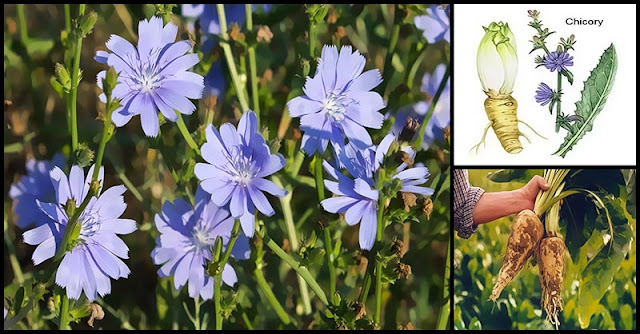At this present time, liver diseases (including cirrhosis) is known to be the leading cause of disability and death.
If you want to protect your liver in a natural way, then you can take chicory (Cichorium intybus L.), a flowering plant that belongs to the dandelion family, which has been found to possess hepatoprotective properties.
The Journal of Dietary Supplements published a study regarding the phytochemical and liver-protective activity of dried chicory extract against carbon tetrachloride-induced liver damage in mice.
Egyptians in the past have been using chicory as an herbal medicine for keeping the gallbladder and liver healthy. Science has also validated the herb’s benefit on the liver. According to the Egyptian researchers at Mansoura University, chicory might help reduce oxidative stress and liver injury in certain circumstances.
Five groups of mice were involved in the study:
- The first group – served as the control
- Second Group – received carbon tetrachloride
- The third group – third received dried chicory extracts only
- Forth group – received chicory extracts
- The fifth group – received silymarin
The given chicory extracts were at a dose of 500 milligrams per kilogram (mg/kg) body weight.
After administration of carbon tetrachloride, it was found that it caused damage to the liver. This is because it caused significant changes in alkaline phosphatase (ALP), alanine aminotransferase (ALT), bilirubin, albumin, total protein, aspartate aminotransferase (AST), and gamma-glutamyl transferase (GGT). However, after the administration of chicory extracts, these changes were brought back to their normal values.
Furthermore, these findings were supported by the histopathological tests of liver tissues. Generally, these outcomes only show that chicory extracts contain strong liver-protective effects. Thereby, the researchers concluded that the treatment with chicory extracts could protect the liver from damage and even treat a liver injury.
Other Herbs For Liver Health
Aside from chicory, there are other herbs that show promising natural means of protecting and improving liver health.
Milk Thistle
Those with cirrhosis of the liver may benefit from milk thistle. A report published in 2001 analyzed five clinical trials with a total of 602 cirrhosis patients. Based on the gathered data, it was revealed that treatment with milk thistle could result in a significant decrease in liver-related death. It was even suggested by some studies that milk thistle may also help fight inflammation related to hepatitis C and protect liver cells from damage.
Burdock
This herb is widely used as a natural detox remedy and also has liver-protective effects. Studies suggest that it may help protect liver cells from damage caused by acetaminophen, a drug widely used to relieve pain. Some studies even found that burdock has antioxidants that may minimize the harmful effects of toxic substances formed from the metabolism of acetaminophen and might help protect the liver from damage caused by alcohol intake.
Turmeric
According to preliminary research, people with hepatitis B and hepatitis C may benefit from consuming turmeric. Studies found that turmeric extract can help prevent the replication of the hepatitis B virus. In a test tube study published in 2010, research showed that turmeric extract might help suppress the hepatitis C virus from replicating.
Other Ways To Protect Your Liver
Having a healthy lifestyle also keeps your liver healthy. The American Liver Foundation recommends these lifestyle tips to keep your liver healthy:
Avoid Exposure To Toxins
Touching or breathing in toxins can harm your liver cells. Avoid using insecticides, cleaning and aerosol products, and chemicals because all of them contain toxins. Also, refrain from smoking since additive in cigarettes also have toxins.
Follow A Healthy Diet And Exercise Regularly
For the liver to function well, a healthy diet and regular exercises are necessary. Unhealthy eating, such as eating lots of fatty foods, can increase your risk of being overweight and developing nonalcoholic fatty liver disease.
Limit Alcohol Consumption
Alcohol harms or destroys liver cells, thus resulting in liver damage that can result in the buildup of fat in the liver, inflammation or swelling of the liver and scarring of the liver. Even a small amount of alcohol can make liver disease worse.









